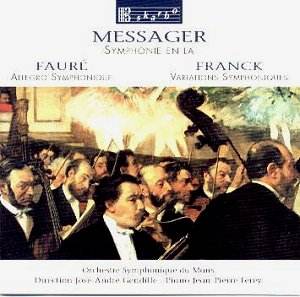This must have been one of the last recordings made
by the Le Mans Symphony Orchestra founded by Jean Françaix’s
father in the 1920s. It flourished for many years, turning professional
in the 1980s, only to disband in 1996 due to money shortages. In 1992
they were recorded live giving a Franco-Belgian concert of symphonic
literature of which only one work, the perennial Franck, will be familiar.
The advantage for the record buyer is clear – two works not otherwise
(to the best of my knowledge) in the catalogue given in good, disaster-free
performances and in idiomatic style. The disadvantage is the quality
of the unearthed material because, in all honesty, and as one who reveres
Fauré, it would take the oratory of Plato to defend this slight
effusion. His op 68 was a Suite d’orchestre in three movements of which
this is the first, and written between 1867 and 1873. Its premiere was
given in piano duet form by the composer and Saint-Saëns. Whilst
it would be wrong to say that the work is not without merit – it embeds
some delightful lightness and lyrical felicities in the score – the
material as such is neither particularly distinctive nor especially
symphonic. The lyricism moreover doesn’t quite "join up,"
Fauré clearly having some difficulty with the syntax of a larger
orchestral score. As a result it seems sectional, and rather shapeless
despite the relative formality of the name by which it is now known,
the Allegro Symphonique. Allegro pas de Symphonique is perhaps
a more apt title, for all its straining after a degree of grandeur.
The orchestral strings of the Le Mans orchestra sound a mite undernourished
here, though the brass are nicely warm and shape well.
Messager wrote a symphony. It was news to me as well.
He was twenty-two, full of ambition and presumably eager to join the
symphonic club. The symphony was first performed by that indefatigable
promoter of the native literature and spotter of talent, Colonne, in
1878. In the expected classical four movements this is a solidly mid-century
Mendelssohnian work. The first movement – sonata form – is fresh nevertheless
and melodic and goes with a mellifluous ease with occasional Schumannesque
outbursts. The slow movement is gravely attractive and lyrical and has
a curiously compelling seriousness – it might do to extract this as
an occasional piece because it’s too good to lie languishing on the
shelves. The presto has a slightly heavy tread in a Mendelssohnian way
but is full of life with verdant wind choirs and gruff lower strings.
Messager can’t resist a youthful flirtation with fugato but the trio
is nicely spun and relaxed. The finale hardly surmounts that nineteenth
century conundrum, the Symphonic Finale Problem, but whilst hardly distinguished
thematically is at least sturdy and pleasant. The Franck is of course
the odd man out. It receives an equable and attractive reading avoiding
the brittleness that can afflict other performances – some warmth here
and attentive musicality from Jean-Pierre Ferey.
The recordings are decent – some of the fortes in the
Messager seem a little harsh – and the repertoire of interest to Francophiles
looking for youthful evidence of traditional symphonic aspirations from
two composers who made their names predominantly in other forms.
Jonathan Woolf
